Congratulations! You’re thinking about expanding your family, or maybe you already are! This exciting time is often filled with anticipation, daydreams of tiny fingers and giggles, and of course, the question on everyone’s mind (including yours!): am I pregnant?
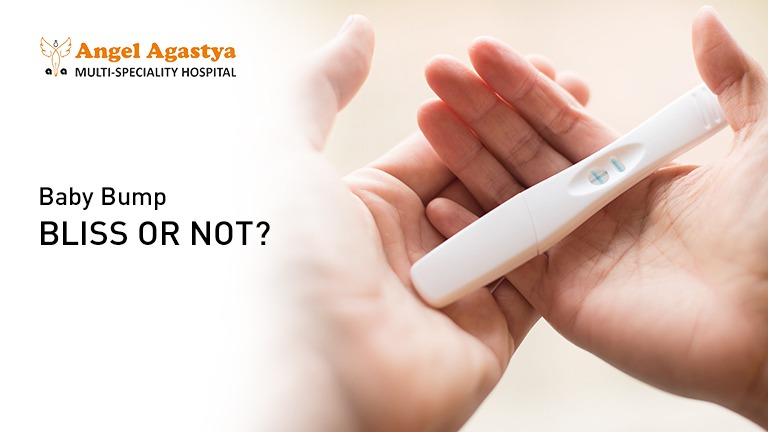
While some women experience a textbook of early pregnancy signs, others might not have any noticeable changes at all. This can lead to a rollercoaster of emotions – is it happening, or isn’t it? Fear not, future mamas (or hopeful mamas!), this blog is here to be your guide. We’ll explore the world of early pregnancy signs (and the not-so-obvious ones too!), bust some myths, and most importantly, empower you to navigate this exciting (and sometimes confusing) phase.
Understanding Early Pregnancy:
The first trimester, those magical (and sometimes not-so-magical) 12 weeks, is when your body is working hard to create a tiny miracle. Hormone levels fluctuate, your body adjusts, and for some women, these changes manifest in a variety of ways. But remember, every pregnancy journey is unique!
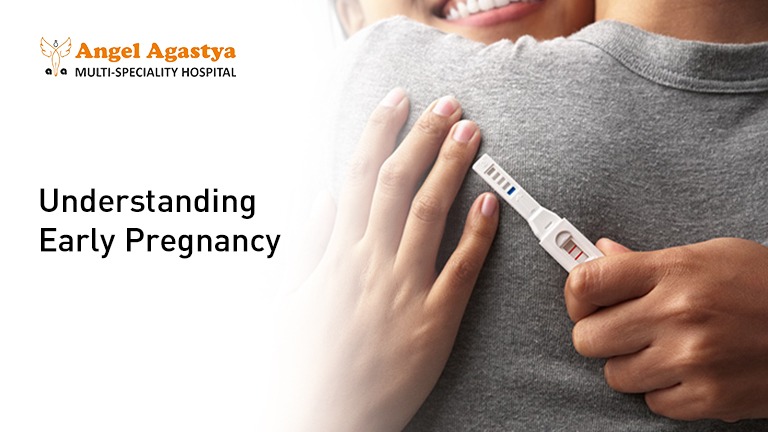
The Classic Pregnancy Signs (But Not Always!):
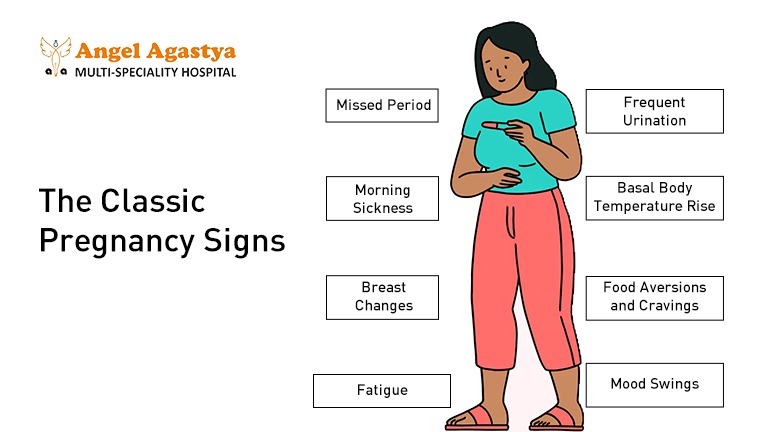
- Missed Period: This is often the first and most obvious sign, but it can also be caused by stress, hormonal imbalances, or certain medications.
- Morning Sickness (or All-Day Sickness!): Nausea, vomiting, or just a general feeling of “ugh” can be a common visitor, though not everyone experiences it.
- Breast Changes: Tenderness, swelling, or changes in nipple color or texture can occur as your body prepares for milk production.
- Fatigue: Feeling wiped out? Blame the pregnancy hormones! They can zap your energy levels, especially in the first trimester.
- Frequent Urination: The growing baby puts pressure on your bladder, leading to more frequent bathroom trips.
- Basal Body Temperature Rise: If you’re tracking your basal body temperature, you might notice a sustained rise after ovulation, which can indicate pregnancy.
- Food Aversions and Cravings: Suddenly hate the smell of coffee? Craving pickles and ice cream? Pregnancy can unlock a love for new flavors and resurrect childhood favorites.
- Mood Swings: Feeling like an emotional rollercoaster? Pregnancy hormones can trigger mood swings, so be kind to yourself!
Wait, I Don’t Have Any Symptoms! What Does That Mean…?
Not necessarily! As mentioned before, every pregnancy is unique. Some women experience very few or even no noticeable symptoms in the early stages. This doesn’t mean there’s something wrong!
Here’s why:
- Early Days: It takes time for hormone levels to rise significantly, so you might not feel any symptoms in the very early weeks.
- Individual Differences: Just like fingerprints, pregnancy experiences are unique. Some women are like finely tuned instruments, responding strongly, while others are more resilient.
- Underlying Health Conditions: Certain health conditions can affect how you experience pregnancy symptoms.
So, You Don’t Have Classic Signs. What Now?
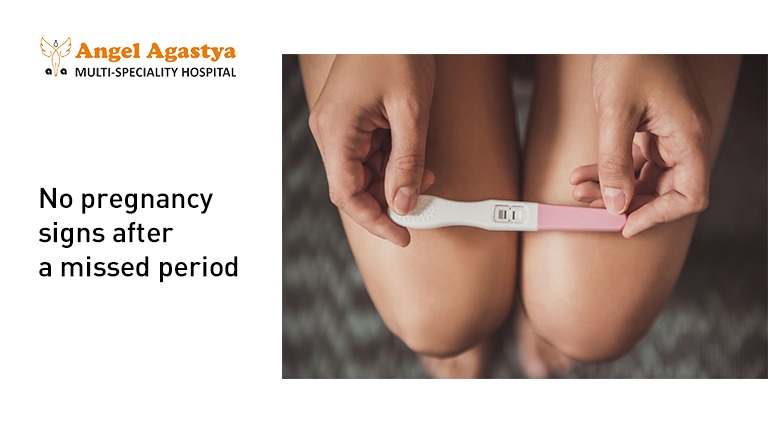
If you’re actively trying to conceive and haven’t experienced any pregnancy signs after a missed period, here are some steps you can take:
- Take a Home Pregnancy Test: These tests are readily available and can be quite accurate, especially with early morning urine.
- See Your Doctor: A doctor can confirm a pregnancy with a blood test or ultrasound. They can also address any concerns you might have and discuss your prenatal care plan.
- Be Patient: It might take some time to conceive. Don’t get discouraged if you don’t see a positive test right away.
Remember: Your emotional and mental well-being are crucial during this time. If you’re feeling stressed or overwhelmed, talk to your partner, a trusted friend, or a therapist. There are also many online communities and resources available for women trying to conceive.
Beyond the Signs: Focusing on Your Well-Being ♀️
Whether you’re experiencing a multitude of pregnancy signs or none at all, the most important thing is to focus on your overall well-being. Here are some tips:
- Maintain a Healthy Lifestyle: Eat nutritious foods, exercise regularly (as your doctor advises), and get enough sleep.
- Take Prenatal Vitamins: These vitamins provide essential nutrients for you and your baby’s development, even before conception.
- Reduce Stress: Stress can affect your fertility. Consider yoga or meditation to quiet the anxieties and practice relaxation.
- Stay Hydrated: Drinking plenty of water is essential for overall health and during pregnancy.
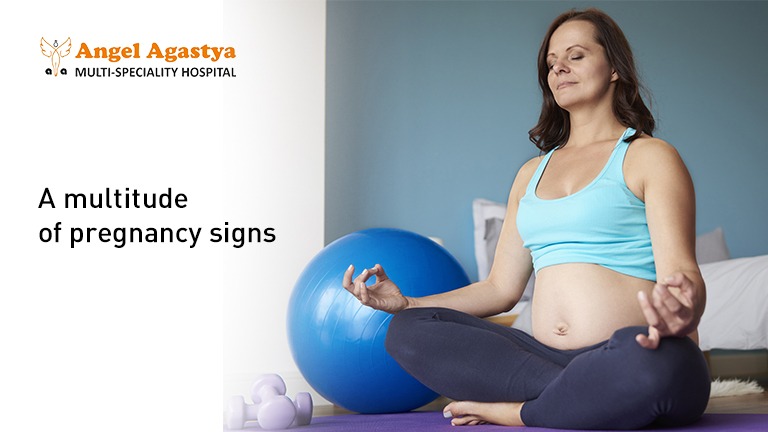
The Journey to Parenthood is a Personal One
Trying to conceive and navigating early pregnancy can be an emotional rollercoaster …but remember, mama (or mama-to-be!), you’re not alone! Millions of women embark on this journey every year, and each experience is unique. Embrace the excitement, address any anxieties you have, and don’t hesitate to seek support.
Some helpful resources:
- American Pregnancy Association: https://americanpregnancy.org/
- March of Dimes: https://www.marchofdimes.org/
- Resolve: The National Infertility Association: https://resolve.org/
- National Council for Family Relations: https://www.ncfr.org/
Summary:
The Bottom Line
The presence or absence of early pregnancy signs doesn’t define your journey. Whether you’re greeted by morning sickness or feel nothing out of the ordinary, focus on taking care of yourself and creating a healthy environment for potential conception. Trust your body, listen to your intuition, and embrace the beautiful adventure of trying to conceive.
Building a family is a journey of love, not just a pregnancy test. Adoption, fostering, and surrogacy are all incredible ways to create a loving home. Adoption, fostering, and surrogacy are all incredible ways to build a loving family. Focus on the love you have to offer, and the journey will unfold in its beautiful way.
Trying to conceive? Wondering if you’re pregnant? This blog explores the world of early pregnancy signs (and the not-so-obvious ones!), busts myths, and empowers you to navigate this exciting, sometimes confusing, phase. It emphasizes that every pregnancy journey is unique, and the absence of classic signs doesn’t mean you’re not pregnant. We also provide resources and tips for a healthy pre-conception journey.
This blog aimed to be a source of information and support during the early stages of trying to conceive. We hope you found it helpful! If you have any questions or comments, feel free to leave them below. We’re always happy to hear from you!
Remember, a positive pregnancy test isn’t the only path to parenthood. Adoption, fostering, and surrogacy are all incredible ways to build a loving family. Focus on the love you have to offer, and the journey will unfold in its own beautiful way.
FAQs:
1. What is the most accurate early pregnancy sign?
A missed period is often the first sign, but a home pregnancy test or doctor’s confirmation is most accurate.
2. Can stress delay ovulation or implantation?
Yes, chronic stress can affect hormone levels and potentially delay conception.
3. What is basal body temperature (BBT) tracking?
BBT involves monitoring your resting body temperature to identify ovulation and potential pregnancy.
4. Are there risks associated with lifting weights while pregnant?
No, with proper guidance and modifications, weightlifting can be safe during pregnancy.
5. What is a prenatal vitamin?
A prenatal vitamin provides essential nutrients like folic acid and iron to support your health and baby’s development before and during pregnancy.
6. What is the difference between a blood test and urine test for pregnancy?
Both can be highly accurate, but a blood test can detect pregnancy hormones earlier than a urine test.
7. What is an ultrasound?
An ultrasound uses sound waves to create an image of the baby in the uterus, typically used later in pregnancy to confirm viability and development.
8. What are some relaxation techniques to manage stress while trying to conceive?
Yoga, meditation, and deep breathing exercises can be helpful.
9. What is infertility?
Infertility is the inability to conceive after one year of trying (or 6 months if you’re 35 or older). It can affect both men and women.
10. What are alternative paths to parenthood?
Adoption, fostering, and surrogacy are all loving ways to build a family.
